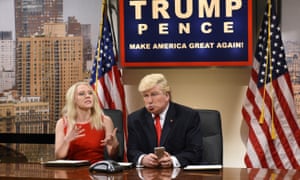Extract from The Guardian
As
the boundaries between caricature and reality become so thoroughly
blurred, we need humour more than ever

Vanity
fair … Alec Baldwin and Kate McKinnon on the US TV series Saturday
Night Live. Photograph: Will Heath/AP
Friday
6 January 2017 23.00 AEDT
I’ve
always quite liked Alec
Baldwin, but like many liberals I now regard him with something
approaching hero-worship for his series of brilliant Donald Trump
impersonations during the latest season of Saturday
Night Live.
The last sketch before Christmas was especially sharp. After the
president-elect has been visited in Trump Tower by a bare-chested
Vladimir Putin, who generously declares that he doesn’t want a gift
from Trump because “You are the gift, Donald”, Rex
Tillerson(played by John Goodman) arrives, and soon huddles into
a corner with Putin to discuss the carving up of Russian oilfields in
return for lifted sanctions.
Trump/Baldwin
listens in, bewildered, out of his depth and out of the loop. “What
are you guys talking about?” he asks. Putin says “Don’t worry
about it”, before resuming his chat with Tillerson, getting ever
more technical until Trump butts in with: “And then we destroy
Vanity Fair, right? Terrible publication, just terrible.” Putin and
Tillerson give him withering, indulgent looks – toleration of this
buffoon being the price they have to pay for a new, mutually
beneficial relationship between Russia and Exxon.
When
I viewed this clip on YouTube, two days after broadcast, it had had 5
million views and attracted more than 10,000 comments. Impressive
that a piece of modern satire should hit its target so accurately –
the sketch really nails the vanity and ignorance that seem to drive
Trump, and that will no doubt allow his cabinet free rein – while
reaching such a large audience. On the other hand, the audience may
be large, but is it wide? Most satire preaches to the converted.
Writing about Beyond
the Fringe as
early as 1963, Michael
Frayn pointed out that the effect of the boom in political
comedy that it spawned “is not to undermine but to confirm the
audience’s prejudices, and has less in common with satire than with
community hymn-singing – agreeable and heartwarming as that may
be”. A quick glance through the comments on YouTube beneath the
Baldwin sketch shows that this is still true, and reveals a tedious,
predictable confirmation bias: the posts are evenly split between
people praising the skit and those expressing contempt for the
liberals who find it funny.
It’s
one of the perennial paradoxes of satire that it only gives pleasure
to those who already share its point of view. (Those on the left who
doubt this assertion should try sitting through An
American Carol,
David Zucker’s abysmal 2008 lampoon of Michael Moore,
featuring Kelsey
Grammer and Paris Hilton among others.) George S Kaufman
famously claimed that “satire is what closes on Saturday night”,
and by and large he was right: who wants to pay good money, after
all, to have their core beliefs challenged and insulted? Nonetheless,
closing the door on 2016, this feels like a time when satirists are
really needed to step up to the plate: not just to provide a bit of
pleasure for progressives and liberals the world over, who suddenly
find themselves wrong-footed by history and crave the consolation of
that “community hymn-singing” more than ever; but also to offer
some much-needed moral clarity, a rough and ready, cartoonish
shortcut to the truth – a way of exposing the ridiculousness of the
lies that currently frame bigots and racists as straight-talkers, and
unaccountable elites (such as Trump’s billionaire backers, the
Koch brothers and Robert Mercer) as friends of the ordinary
people. In short, the present moment calls for absurdism, caricature
and tomfoolery, because these are the only ways to capture our
current reality.
The
problem for today’s satirist, though – and I feel this keenly
myself, as an occasional practitioner – is keeping up with that
reality in the first place. If your stock-in-trade is comic
exaggeration, you face new challenges all the time. To give just a
small example: in my novel Number
11,
wanting to satirise the silliness of prize culture, a culture in
which artists and others can only be ascribed worth by being put in
competition with one another, I invented what I thought was the
stupidest idea imaginable: the Winshaw prize, a prize for the best
prize, in which the Booker, the Turner, the Pulitzer and others fight
it out for supremacy every year. A few months later in Private Eye I
read that an outfit called the Global Conference Network is setting
up the “Awards awards”. “With directors of awards companies as
judges,” their website proclaims, “this is a long overdue chance
to receive recognition for the best awards initiatives and
ceremonies.” (That “long overdue” is especially astounding.)
What’s a satirist to do?
The
problem for today’s satirist is keeping up with the reality in the
first place
It’s
only a short step from this to realising that the corrupt, greedy
Winshaw family I originally created for my novel What
a Carve Up! is
far outstripped by our own David Cameron, who, having reduced the
country to chaos with his foolish referendum has now signed up with
the Washington Speakers Bureau and is giving talks in the US on his
Brexit disaster for a fee of $120,000 (£98,000) an hour, while the
rest of us flounder around at home trying to clear up the mess.
Wondering
how satirists might deal with all this – and thinking of the US
situation in particular – I’ve been revisiting a novel that made
a big impression on me as a teenager, Joseph Heller’s Good
As Gold.
Back in 1979, its year of publication, this was seen as Heller’s
return to the savage irony of Catch-22.
(The New York Times called it a “huge and honourable risk” and “a
nightmare of abuse and opportunism, of surreal graffiti”.) Into the
maelstrom of Washington power games it thrusts its amoral academic
protagonist, Bruce Gold, a man who doesn’t so much want to drain
the swamp as trawl it for financial and sexual opportunities. Gold is
a man who never starts anything, let alone finishes it. His book on
the “Jewish experience” remains perpetually unwritten, just as
his Washington career flourishes even though he never learns his job
title, or why he keeps being promoted, or why everyone prefers him
not to write the reports he is commissioned to write, or why his
gloomy jokes are taken as brilliant policy pronouncements.

Russian-American
novelist Gary Shteyngart, who recently tweeted: ‘The NY Times piece
about Rick Perry’s nomination as energy sec can be read as
satirical fiction.’ Photograph: Ulf Andersen/Solo
“You’re
boggling my mind!” his mentor Ralph Newsome keeps telling him,
after hearing the phrase from Gold’s own lips (“I don’t think
I’ve ever heard boggle used with an animate subject before”), and
the reader’s mind is boggled, too, by Heller’s portrait of a
political class characterised not so much by corruption as endless
vacuity, self-contradiction and lack of serious principle. And yet I
wonder if Good
As Gold would
be adequate as a response to the Washington of 2017, in an age when
the boundaries between reality and caricature have become so
thoroughly blurred; an age when (as the Russian-American
novelist Gary
Shteyngart recently tweeted) “Every single line in the
[New York] Times piece about Rick
Perry’s nomination as Energy Sec can be read as satirical
fiction.”
In
fact, rereading Good
As Gold filled
me with nostalgia more than anything else, because it depicts an
America that, for all its venality, sits at the head of a stable
world order. That world order started to unravel in 2016 – for
better or worse. (Guess which one I’m betting on.) Perhaps such
epoch-defining events are best portrayed not in satirical terms
but through the lens of magic realism: the kind of rueful, ironic
magic realism that you find, say, in Bohumil Hrabal’s masterpiece I
Served the King of England,
which tells the story of mid 20th-century Europe through the eyes of
Ditie, an ambitious Czech waiter, and proceeds via a succession of
haunting, pivotal moments when “the unbelievable came true”. The
culmination of these occurs when Ditie, newly released from prison,
accompanies a fellow inmate – a murderer – back to his home
village. “We walked up to the top of a small rise, not much more
than a sigh in the earth, and he said that from here we should be
able to see his native village. But … not a single building was
visible.” It turns out that they are searching for Lidice, which
has been razed to the ground by the Nazis, and has vanished
completely from the face of the earth. The murderer falls to the
ground in disbelief, his knees trembling.
I
confess that when I think of the way history turned on its axis in
2016, my satirist’s impulse threatens to desert me, and I wonder
instead how Hrabal would have dealt with it. Consider the cases
of Alexander
Dugin, the neofascist Russian philosopher, and Steve
Bannon, the former editor of Breitbart US.
Until recently, these people were considered near-lunatics, deluded
dreamers on the very fringes of acceptable political thought, lost in
fantasies of white supremacy, ultra-conservatism and denial of
hard-won equal rights for ethnic and sexual minorities.
Now,
one of them whispers policy into the ears of Vladimir Putin, and the
other is chief strategist to the White House. 2016 was indeed the
year in which the unbelievable came true. It should, in the words of
Ralph Newsome, boggle all of our minds.
No comments:
Post a Comment